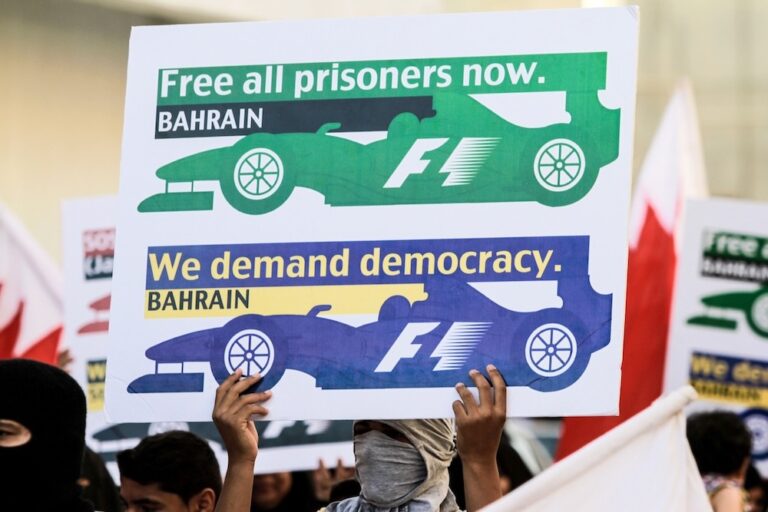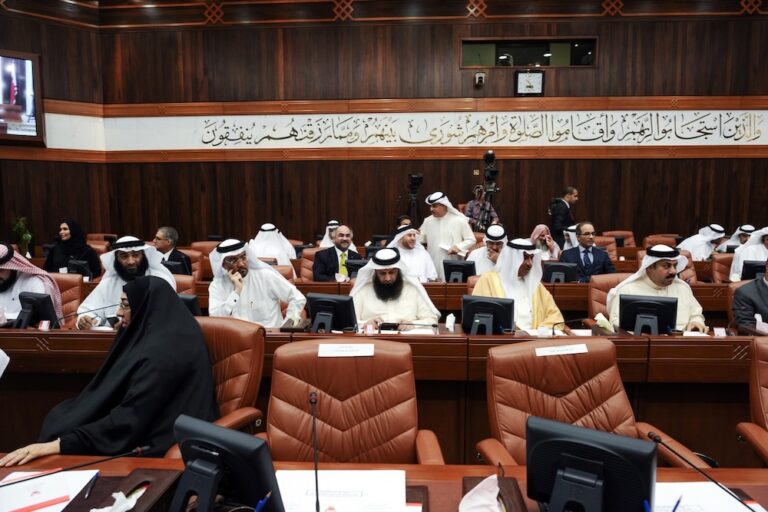(BCHR/IFEX) – The Bahrain Center for Human Rights expresses great concern over the arrest and interrogation of seven citizens by the national security service in Bahrain over their role in publishing the newsletter “Wifaq” and Awal news website. After being released on 29 June 2008, the detainees said they were subjected to beatings and ill-treatment […]
(BCHR/IFEX) – The Bahrain Center for Human Rights expresses great concern over the arrest and interrogation of seven citizens by the national security service in Bahrain over their role in publishing the newsletter “Wifaq” and Awal news website.
After being released on 29 June 2008, the detainees said they were subjected to beatings and ill-treatment for 24 hours at the premises of the National Security office. The detainees included Adel Al Aaly, Mohammed al-Musawi, Sayed Tahir Asfour and Mohammad Noman, administrators of the newsletter published by the Al-Wefaq Islamic Society. The investigation also included three others – Ali Shihabi, his brother Suhail al-Shihabi and Hussein Marzouq – involved with the website Awal, which the Ministry of Information shut down several days earlier on the pretext that it incited sectarianism.
Mohammed al-Musawi and Ali Shihabi were both examined by a forensic medical office on the request of their lawyers due to signs of physical assault, said lawyer Abdullah Al Shamlawi, who noted bruises on Shihabi’s face and wounds on his right arm. Adel Al Aaly and Suhail al-Shihabi complained that they were struck in the face.
The detainees were released after they were transferred to the prosecutor general and charged with “inciting hatred against the regime and dissemination of news that would raise sectarian divisions in a way that affects the general peace and public order.” The sites in question have published information about administrative and financial corruption in the government, the seizure of large areas of public land and coasts, unlawful political naturalisation on a sectarian basis for tens of thousands of non-Bahrainis and a network headed by a member of the royal family that penetrates the opposition and raises sectarian tension. All these issues are related to the Royal Court and senior members of the King’s family.
A few days earlier, activist Abdullah Bou-Hassan was arrested and threatened for writing an article published in the “Democrat” newsletter issued by the National Democratic Action Society and for displaying a notice in his car stating his opinion.
In another disturbing development, the Minister of Interior had a two-day meeting with members of parliament, including members of the Al-Wefaq Islamic Society. The meeting, followed by press releases on behalf of the Ministry of Interior, warned against harming the dignity and image of the royal personality, which could be considered a warning to activists and media of more restrictions on freedom and prosecution. MPs belonging to the Al-Wefaq Islamic Society were subjected to humiliation and threats of use of force by security forces when they were outside the National Security building during the interrogation of detainees who belong to the Society. Seventeen of the 40 deputies in the House of Representatives are members of the Al-Wefaq Islamic Society.
With regard to the restriction of freedom of expression under the pretext of protecting the royal image, the symbol of the country and his personality, Nabeel Rajab, BCHR’s vice-president, said: “Many violations in Bahrain are committed using the name and powers of the king, or through the Royal Court that belongs to him, which is widely believed responsible for many of the problems facing the island in the past few years, such as sectarian discrimination, sectarian tension and unlawful political naturalisation. Hence, the king became a party to the conflict rather than the symbol and umbrella of national unity.”
BCHR, therefore, finds that the closure of electronic forums, the arrest and prosecution of journalists or bloggers and the threats to the press, political groups and civil society institutions in the name of protecting royal dignity are considered suppression of freedom of expression that undermines the ability of these parties to protect freedoms and basic rights.
Accordingly, BCHR urges the King of Bahrain to intervene to stop any violations of freedom in his name, including harassment of journalists, banning websites and threatening activists or bloggers. BCHR calls upon the king of Bahrain to continue his role in urging more dialogue and reforms aimed at strengthening freedoms and human rights, which cannot be achieved without freedom of the press and expression.
Updates alert on website closures: http://ifex.org/en/content/view/full/95099


